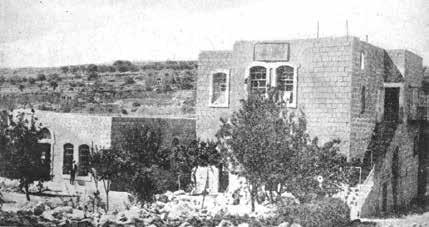76 48
DECEMBER 3, 2020 | The Jewish Home OCTOBER 29, 2015 | The Jewish Home
Parsha Ponderings Parshas Vayishlach
Money or Life? By Rabbi Shmuel Kamenetzky
I
n Parshas Vayishlach, we learn how Yaakov Avinu, on his way to greet Eisav, crosses the Yabok River and forgets small jugs. He goes alone to retrieve them and meets the Angel of Eisav. The angel tries to overpower him, injuring him in the process. Why did Yaakov risk his life to retrieve such trivial items? The Gemara (Chulin 91a) explains that the money and possessions of tzaddikim is more precious to them than their bodies, for they do not participate in acts of theft.” Simply understood, the righteous treat their possessions in high regard, for they were acquired with holiness and service of Hashem, as only honest and proper means were used to acquire them. Perhaps we can understand this concept on a deeper level. My father, Rav Mordechai Kamenetzky, printed the following story in his book, “Parsha Parables.” Rabbi Betzalel Zolty, Chief Rabbi of Jerusalem, of blessed memory, related the following story: The rosh yeshiva of Slabodka Yeshiva, Rabbi Moshe Mordechai Epstein, was in America in 1924, raising much-needed funds for his yeshiva. During his visit, he received an urgent telegram. The Lithuanian authorities were going to conscript the Slabodka students into the army. The Alter of Slabodka, Rabbi Nosson Zvi Finkel, founder and Dean of the yeshiva, made a decision to open a branch of Slabodka Yeshiva in the ancient city of Chevron in
Eretz Israel. He would send 150 students to what was then known as Palestine to establish the yeshiva, and in this way free them from service in the apostatizing, ruthless Lithuanian army. That monumental undertaking would require a sum of 25,000$ to transport, house, and establish the yeshiva. Rabbi Epstein was put to the task. He discussed the program with a dear friend of the yeshiva, Mr. Schiff, who immediately decided to contribute the massive sum in its entirety.
the man got up to speak at a parlor meeting on behalf of the yeshiva. “My dear friends,” Mr. Schiff began. “I do not wish my business misfortunes on anyone. I invested literally millions of dollars in all sorts of businesses, and they all failed. I have absolutely nothing to show for them. But there is one investment I made that continues to bear fruit. I gave 25,000$ to establish a yeshiva in Chevron, and that investment is the best one I ever made. One must know where to invest.” When Rabbi Sarna heard that
“I gave $25,000 to establish a yeshiva in Chevron, and that investment is the best one I ever made.”
Years later, in the early 1930s, the tide turned for Mr. Schiff. With the crash of the stock market and plummeting real estate prices, it took only a few months before he was forced out of his own apartment and was relegated to the cellar of a building that was once his, existing on meager rations. At the same time, the health of Rabbi Epstein was failing, and he no longer had the strength to travel to raise funds. His son-in-law, Rabbi Yechezkel Sarna, made the trip to America in his stead to raise funds for the Slabodka Yeshiva. He did not know of Mr. Schiff’s situation until
Mr. Schiff was literally bankrupt, he cabled Rabbi Epstein, who quickly arranged to give him a 5,000$ loan in order to get him back on his feet and begin doing business again. Through some generous benefactors, Rabbi Sarna got a hold of the cash and went directly to the basement apartment where Mr. Schiff now resided. He explained to him that Rabbi Epstein insisted he take this money as a loan. Mr. Schiff jumped up in horror, “What do you want from my life? The only money I have left is the 25,000$ that I gave the yeshiva. Do you want to take that from me as well?”
My grandfather, Rav Binyamin Kamenetzky, zt”l, would explain in the name of Rav Meir Shapiro, rosh yeshiva of Yeshiva Chachmei Lublin and founder of the Daf Yomi. Materialistic people and resha’aim value themselves more than their money. After all, they use all their money in pursuit of physical pleasure. Obviously, their ultimate goal is their physicality. Tzaddikim, however, are just the opposite. They exert as much energy as possible to utilize their physical being for the service of Hashem. And whatever they cannot attain with their own bodies, they use their money to accomplish. They’ll use money to achieve another act of chessed, a mitzvah, or a few extra hours of daily Torah learning. In a tzaddik’s eyes, his money is more powerful and more beloved to him that his body, for his money can sometimes accomplish more in the service of Hashem than his body alone.
Rabbi Shmuel Kamenetzky is the Director of Advancement at Yeshiva of South Shore – Yeshiva Toras Chaim Beis Binyamin. He is currently compiling the Torah thoughts from his grandfather, Rav Binyamin Kamenetzky, zt”l, into print, in Hebrew and English. If you have any stories or divrei Torah to share from his grandfather, or to subscribe to receive a weekly dvar Torah from Rav Binyamin Kamenetzky’s teachings, you can email him at skamenetzky@yoss.org.























